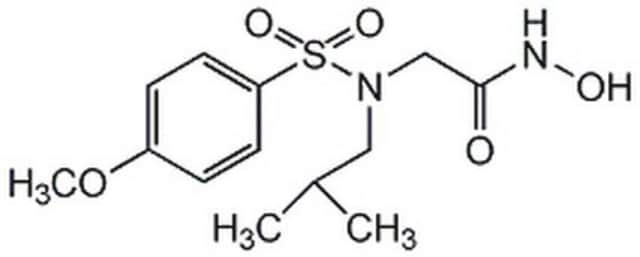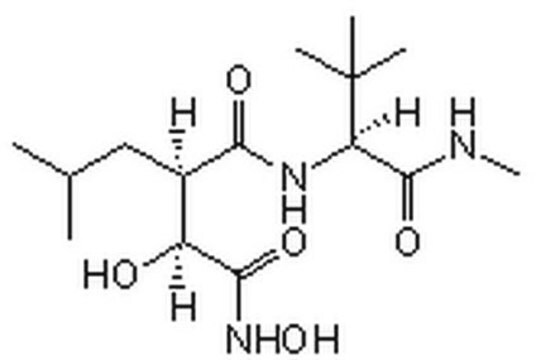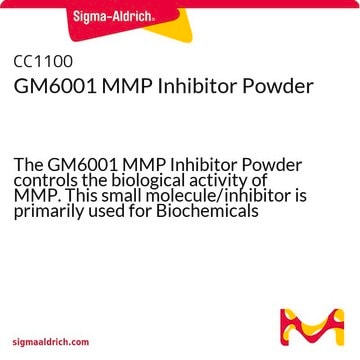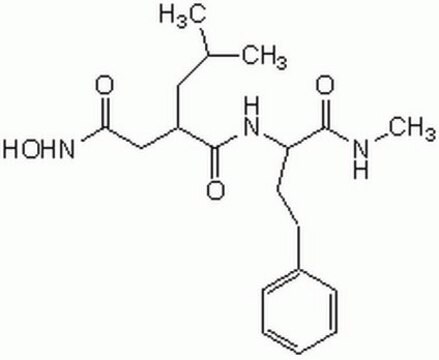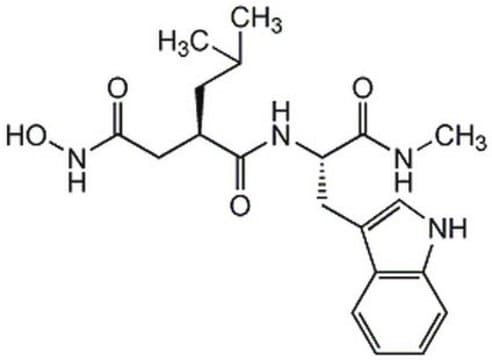444290
MMP Inhibitor V
The MMP Inhibitor V, also referenced under CAS 223472-31-9, controls the biological activity of MMP. This small molecule/inhibitor is primarily used for Protease Inhibitors applications.
Synonym(s):
MMP Inhibitor V, (2S,4S)-N-Hydroxy-5-ethoxymethyloxy-2-methyl-4-(4-phenoxybenzoyl)aminopentanamide, ONO-4817
About This Item
Recommended Products
Quality Level
Assay
≥98% (HPLC)
form
solid
manufacturer/tradename
Calbiochem®
storage condition
OK to freeze
protect from light
color
off-white
solubility
ethanol: 15 mg/mL
DMSO: 30 mg/mL
shipped in
ambient
storage temp.
2-8°C
InChI
1S/C22H28N2O6/c1-3-28-15-29-14-18(13-16(2)21(25)24-27)23-22(26)17-9-11-20(12-10-17)30-19-7-5-4-6-8-19/h4-12,16,18,27H,3,13-15H2,1-2H3,(H,23,26)(H,24,25)/t16-,18-/m0/s1
InChI key
HDWWQELUBWGQGA-WMZOPIPTSA-N
General description
Packaging
Warning
Other Notes
Ito, N., et al. 2004. Biochem. Biophys. Res. Commun.314, 1008.
Shiraga, M., et al. 2002. Cancer Res.62, 5967.
Mori, T., et al. 2001. Exp. Biol. Med.226, 429.
Yamada, A., et al. 2000. Inflamm. Res.49, 144.
Legal Information
Storage Class Code
11 - Combustible Solids
WGK
WGK 1
Flash Point(F)
Not applicable
Flash Point(C)
Not applicable
Certificates of Analysis (COA)
Search for Certificates of Analysis (COA) by entering the products Lot/Batch Number. Lot and Batch Numbers can be found on a product’s label following the words ‘Lot’ or ‘Batch’.
Already Own This Product?
Find documentation for the products that you have recently purchased in the Document Library.
Related Content
Select different protease inhibitor types based on your needs to prevent protein degradation during isolation and characterization and safeguard proteins in sample prep.
Select different protease inhibitor types based on your needs to prevent protein degradation during isolation and characterization and safeguard proteins in sample prep.
Select different protease inhibitor types based on your needs to prevent protein degradation during isolation and characterization and safeguard proteins in sample prep.
Select different protease inhibitor types based on your needs to prevent protein degradation during isolation and characterization and safeguard proteins in sample prep.
Our team of scientists has experience in all areas of research including Life Science, Material Science, Chemical Synthesis, Chromatography, Analytical and many others.
Contact Technical Service